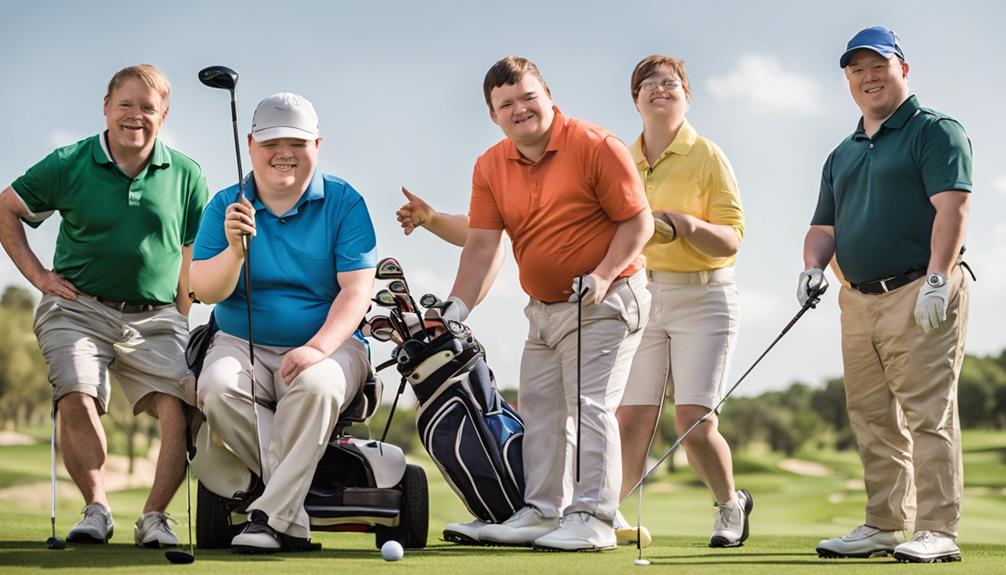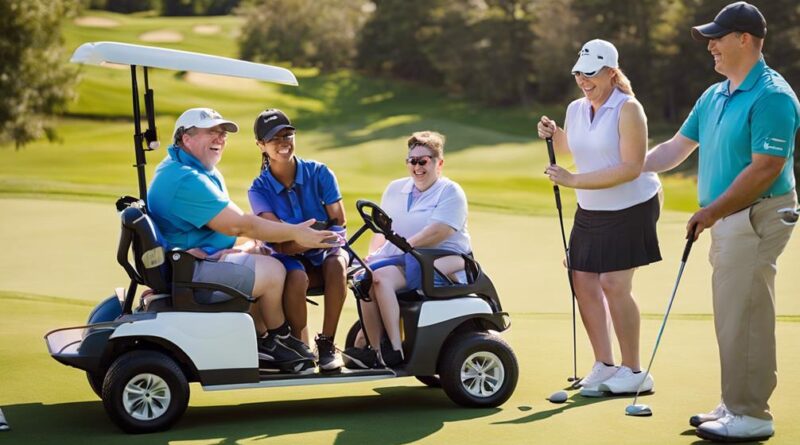7 Best Inclusive Golf Lessons for Special Needs
Inclusive golf lessons for special needs individuals offer tailored coaching, adaptive equipment, sensory-friendly instruction, effective communication, social skills development, physical benefits, and visual support. These lessons are designed to meet diverse requirements and provide a supportive learning environment. Each lesson is customized to address specific needs such as autism, wheelchair users, ADHD, nonverbal participants, Asperger's, cerebral palsy, and Down syndrome. These specialized lessons aim to enhance skills, build confidence, and promote overall well-being. They cater to unique challenges and foster growth in a compassionate and inclusive setting. Explore these comprehensive lessons for a fulfilling golf experience.
Tailored Coaching for Autism
Tailoring coaching techniques to suit the unique needs of individuals with autism can significantly enhance their golf learning experience. When working with individuals on the autism spectrum, it's crucial to consider sensory integration and behavior management to create a supportive and effective learning environment.
Sensory integration plays a fundamental role in the golf learning experience for individuals with autism. Some may be hypersensitive to sensory stimuli, such as bright lights or loud noises on the golf course, which can be overwhelming and distracting. Others may seek sensory input, such as enjoying the feeling of the club hitting the ball. Understanding each individual's sensory preferences and aversions can help tailor the coaching approach to create a more comfortable and focused learning environment.
Behavior management is another key aspect to consider when coaching individuals with autism in golf. Some individuals may struggle with transitions between activities, exhibit repetitive behaviors, or have difficulty with social interactions. Patience, clear communication, and consistency in routines are essential when addressing behavior challenges. Positive reinforcement techniques, such as using visual schedules or providing rewards for desired behaviors, can help motivate and support individuals throughout their golf lessons.
Adaptive Equipment for Wheelchair Users
To enhance the golf experience for wheelchair users, consider incorporating adaptive equipment that caters to their unique needs and abilities. When it comes to individuals using wheelchairs, mobility aids play a crucial role in ensuring they can fully participate in golf lessons. Golf clubs with modifications such as longer grips or adaptive holders can make it easier for wheelchair users to hold and swing the club comfortably. These small adjustments can have a significant impact on their overall experience on the course.
Accessibility challenges are common for wheelchair users, but with the right equipment, many of these obstacles can be overcome. Golf carts designed for accessibility can provide wheelchair users with the ease of movement around the course, allowing them to focus on their game rather than struggling with transportation. Additionally, specialized golf bags that attach to wheelchairs or adaptive golf gloves can further enhance their ability to play comfortably.
Sensory-Friendly Instruction for ADHD
For individuals with ADHD, creating a sensory-friendly environment during golf lessons can greatly enhance their learning experience and overall enjoyment of the game. Golf lessons tailored for individuals with ADHD can incorporate focus techniques to help improve attention span. Understanding and utilizing strategies that cater to their specific needs can make a significant difference in their ability to engage with the sport.
Skill-building activities that focus on motor coordination can be particularly beneficial for individuals with ADHD. These activities can help them develop their physical abilities while also enhancing their concentration and focus on the golf course. By breaking down complex movements into smaller, more manageable steps, instructors can assist individuals in mastering the fundamentals of the game.
During golf lessons for individuals with ADHD, it's essential to provide a patient and supportive environment. Encouraging them to practice mindfulness techniques, such as deep breathing or visualization, can help regulate their energy levels and improve their performance on the course. Additionally, incorporating short breaks between activities can prevent overstimulation and allow for moments of rest and relaxation.
Communication Strategies for Nonverbal Participants
Creating effective communication strategies for nonverbal participants in golf lessons involves understanding and implementing alternative methods to facilitate their engagement and learning experience. When working with nonverbal individuals, paying close attention to their body language and gestures is crucial. These subtle cues can offer valuable insights into their emotions, preferences, and understanding of the golf lesson. By being observant and responsive to these nonverbal cues, you can tailor your communication to better suit their needs and create a more inclusive environment.
Incorporating assistive technology and communication aids can also greatly enhance the learning experience for nonverbal participants. Utilizing tools such as communication boards, picture exchange systems, or speech-generating devices can provide alternative ways for these individuals to express themselves, ask questions, or participate in golf activities. These aids can bridge the communication gap and empower nonverbal participants to engage more actively in the lesson.
It is essential to approach each nonverbal participant with patience and a willingness to adapt communication strategies to suit their unique needs. By creating a supportive and understanding atmosphere, you can foster a sense of inclusion and belonging for nonverbal individuals in golf lessons. Remember, effective communication goes beyond words; it embraces a holistic approach that considers body language, gestures, and the use of assistive technology to ensure that all participants can fully participate and enjoy the benefits of golf lessons.
Social Skills Development for Asperger's
Developing social skills for individuals with Asperger's involves understanding their unique communication styles and fostering a supportive environment for their growth and interaction with others. When working with someone with Asperger's, remember that peer interaction can be challenging. Encouraging participation in group activities can help them learn valuable social cues and improve their communication with others. Patience is key as they navigate these interactions, offering gentle guidance and positive reinforcement along the way.
Emotional regulation is another crucial aspect to focus on when supporting individuals with Asperger's. Helping them recognize and manage their emotions can aid in establishing more meaningful connections with peers. Simple techniques like deep breathing exercises or creating a safe space for them to retreat to when feeling overwhelmed can make a significant difference in their social interactions.
Incorporating social skills training into inclusive golf lessons can provide a structured and supportive setting for individuals with Asperger's to practice their communication and interaction skills. By creating a welcoming and understanding environment, where each individual's unique needs are recognized and respected, you can empower them to develop confidence in social situations and build lasting relationships both on and off the golf course.
Physical Therapy Integration for Cerebral Palsy
Understanding the physical therapy needs of individuals with Cerebral Palsy is key to providing effective support tailored to their unique requirements and abilities. For those with Cerebral Palsy, physical therapy integration plays a crucial role in enhancing quality of life and promoting independence.
Gait analysis is a fundamental aspect of physical therapy for individuals with Cerebral Palsy. By analyzing the walking patterns and identifying areas of improvement, therapists can develop targeted strengthening exercises to address specific muscle groups and improve overall mobility. These exercises are designed to enhance muscle tone, improve coordination, and optimize functional movement patterns.
Balance training is another essential component of physical therapy for individuals with Cerebral Palsy. Through a variety of balance exercises and drills, individuals can improve their stability and reduce the risk of falls. Mobility drills are also incorporated to enhance flexibility, range of motion, and overall physical function.
As you engage in physical therapy integration for Cerebral Palsy, remember that progress may take time and consistent effort. Patience and persistence are key virtues in this journey towards improved physical function and well-being. By working closely with your therapist and following a customized treatment plan, you can make significant strides in enhancing your mobility, balance, and overall quality of life.
Visual Support for Down Syndrome

When supporting individuals with Down Syndrome, incorporating visual aids can greatly enhance communication and understanding. For those with Down Syndrome, colorful visuals play a crucial role in facilitating comprehension and engagement. By using visuals like charts, pictures, or diagrams, you can help individuals with Down Syndrome grasp concepts more effectively. These colorful visuals can make abstract ideas more concrete and easier to follow, fostering a deeper level of understanding.
Structured routines are also essential when providing visual support for individuals with Down Syndrome. Establishing a predictable schedule and incorporating visual schedules can help create a sense of stability and security. Breaking down tasks into manageable steps with the help of visual aids can make activities more manageable and less overwhelming.
When offering visual support to individuals with Down Syndrome, it's crucial to tailor your approach to each person's unique needs. Providing individualized support ensures that the visual aids used are best suited to the individual's preferences and learning style. Positive reinforcement is key in encouraging progress and motivation. Celebrate achievements, no matter how small, to boost confidence and foster a positive learning environment. With patience, compassion, and personalized visual support, individuals with Down Syndrome can thrive and develop essential skills.
Frequently Asked Questions
Are There Scholarships Available for Special Needs Individuals to Participate in Inclusive Golf Lessons?
Scholarship opportunities for special needs individuals in inclusive golf programs vary. Some organizations offer financial assistance to cover program costs or provide adaptive equipment.
Research local golf clubs, disability organizations, or community centers for available resources. Don't hesitate to reach out and inquire about any potential scholarships or support.
With determination and exploration, you may find ways to make inclusive golf lessons more accessible and affordable for those with special needs.
How Can Family Members or Caregivers Get Involved in the Golf Lessons for Special Needs Individuals?
To support your loved one in golf lessons, family involvement is key. Attend sessions to show encouragement and spend quality time together.
Caregiver support can make a big difference, offering assistance and motivation during practice. Be patient, understanding that progress may vary.
Engage with instructors to learn ways to reinforce skills at home. Your involvement can boost confidence and create lasting memories on the golf course.
Is There a Specific Age Range for Participants in the Inclusive Golf Lessons Program?
In the inclusive golf lessons program, there isn't a specific age requirement for participants. The program aims to be flexible and accommodating to individuals of all ages.
Participant eligibility is open to anyone interested in learning and enjoying golf, regardless of their age. Lessons can be adapted to suit the needs and abilities of each participant, ensuring that everyone can benefit from the experience.
Can Individuals With Multiple Special Needs Conditions Participate in the Golf Lessons?
Individuals with multiple special needs conditions can face challenges in participating in golf lessons. However, with the right accommodations and support, they can definitely take part.
The key is to tailor the lessons to suit their specific needs, providing the necessary assistance and guidance along the way. By creating an inclusive and supportive environment, individuals with multiple special needs can actively participate and benefit from the golf lessons.
Are There Opportunities for Special Needs Individuals to Compete in Golf Tournaments After the Lessons?
After the inclusive golf lessons, there are competitive opportunities for you to showcase your skills in tournaments. These events provide a platform for you to further develop your golf abilities and enjoy the spirit of competition.
The lessons aim to equip you with the necessary skills and confidence to participate in these tournaments, offering a chance to engage with the sport in a meaningful and fulfilling way.
Conclusion
In conclusion, there are many inclusive golf lessons available for individuals with special needs, each tailored to their unique abilities and challenges. These lessons provide a supportive and understanding environment for participants to learn and grow, while also improving their physical, social, and cognitive skills.
No matter what special needs someone may have, there's a golf lesson out there that can help them thrive and enjoy the game. Keep exploring and trying new options to find the best fit for you or your loved one.
